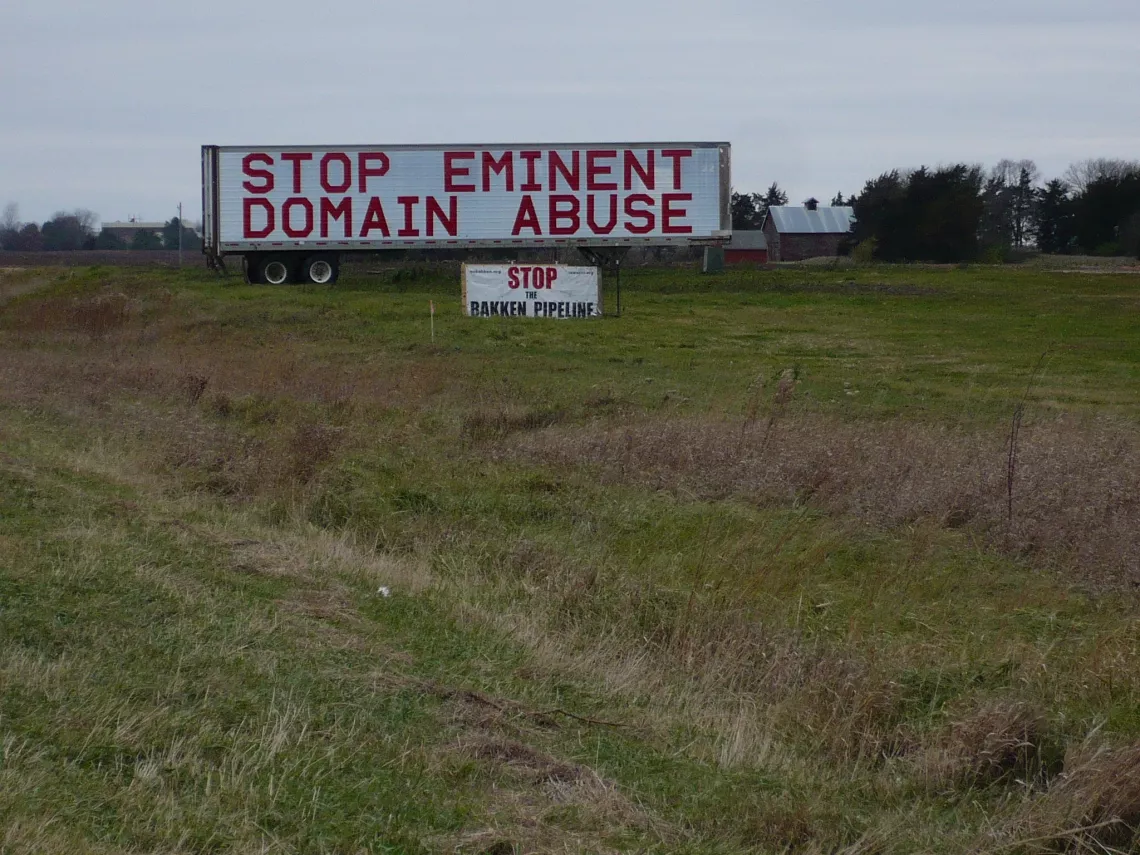Numerous examples point to problems with eminent domain.
In many respects Iowa's easement laws have not kept up with the cross-state, regional or cross-nation transporting of energy and minerals, particularly in adequately compensating the landowner for the use of his or her land. Although the landowners are compensated for the easement, that compensation is paid one-time for the company to build on the property, for the company to have on-going access to the property, and for restrictions on what the landowner can do with the property in the easement. The easement payment does not give the landowner a share of the revenue generated by moving energy and minerals across the easement.
Private companies should not be granted eminent domain for projects funded with tax-increment-financing. Private companies should not be allowed to force a landowner to sell his property via eminent domain.
When public officials are considering whether to grant eminent domain, the potential for increased tax benefits should not be part of the decision. Likewise, the potential for part-time, short-term or long-term jobs should not be part of the decision-making process. The landowners who are using their property for their own enjoyment or employment are also creating jobs and paying taxes. The Iowa Utilities Board used the potential for increased tax benefits and the creation of jobs as a key factor in approving the Dakota Access pipeline.

Forested, prairie or wetland properties should not be eligible for eminent domain since so few natural areas remain in the state. Projects should be routed away from natural areas.
Land agents generally are hired to negotiate the sale of the private property or the easement. Landowners report that the land agents for the Dakota Access pipeline were very disrespectful. Some landowners report being harassed, called multiple times a day by a land agent trying to convince the landowner to sell, lied to and otherwise mistreated by the land agents. Given our long-held tradition of private property rights, landowners need to be protected by a bill of rights:
- Forcibly taking a private property should be a measure of last resort, and only for a public purpose. Iowa law needs to better define a public purpose.
- No private property owner should be subject to eminent domain because another business can use it more profitably or will provide greater economic benefits to the state or society, in the form of items such a property tax, temporary jobs, or permanent jobs.
- Landowners are to be given truthful information about the projects.
- Inferences about the project being approved when the regulatory agency has not issued a permit and authorized the right to eminent domain are to be treated as fraud and subject to prosecution.
- Landowners are the only parties to be contacted and involved in negotiations. Landowners may hire attorneys to represent them in this process. Landowners may also designate other parties, such as family members, to negotiate on their behalf.
- Tenants are to be kept apprised of plans for an easement.
- Access to property prior to regulatory authorization shall only be granted by the landowner or his/her designated representative.
- A landowner is to be given the name and phone number of the land agent, name and phone number of land agent’s employer, as well as the name and phone number of the company who will be owning the easement or the property.
- The land agents are to make appointments to visit with the landowner or the landowner’s representative and not show up at the landowner’s doorstep without an appointment.
- Land agents are not to harass or mistreat landowners.
- The agency that will be granting the eminent domain must investigate all complaints from landowners about being harassed, lied to and otherwise mistreated. Penalties shall be assessed against any land agent, his/her employer and the company requesting the easement or sale of the property found to be acting inappropriately.
- From the point that a property is targeted for an easement, until the decision is ultimately finalized through a voluntary easement or condemnation, the company seeking the easement should be paying rent for the property. Landowners with potential easements find that making basic business decisions about that property, including the siting of structures, sale of the property and potential sale prices, and renting of the property, are affected by a potential easement. Some of the targets for land acquisitions have waited years for a final decision on the route to be granted by the government agency.

Photograph above shows the easement for the pipeline running through a forest near Pilot Mound, Iowa, in the summer of 2018.